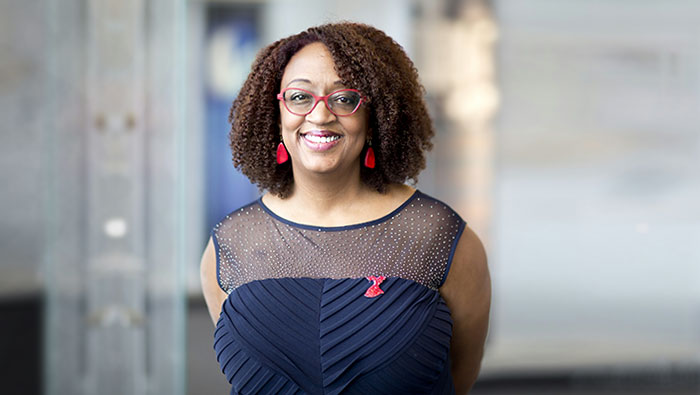Real Woman Alumni 2018-2019 Debora Grandison

Missouri woman learns to be her own advocate for her heart health after 20 years of misdiagnoses.
Debora Grandison’s heart story spans three decades, starting with gestational diabetes and pre-term labor while pregnant with her son in 1988.
Medication at the time caused her heart rate to triple, sending her to intensive care and keeping Grandison, then 28, in the hospital for several weeks. She was then diagnosed with mitral valve prolapse, put on insulin and sent home on bed rest.
After her son was born, her blood sugar levels normalized, but spiked to dangerous levels in 1992, requiring insulin injections.
Two years later, Grandison and her family moved to Ballwin, Missouri, so she shopped for new doctors. She underwent various tests and continued to be treated for mitral valve prolapse, even as her heart palpitations continued.
Still, Grandison’s symptoms of dizziness, shortness of breath and pain in her left arm continued. Twice the pain was so bad she went to the ER, thinking she was having a heart attack. Each time, new tests would suggest a different problem, and Grandison’s medication list grew to 13 before learning she had a hyperactive thyroid.
Between 2001 and 2005, Grandison was coping with another trauma: the death of her brother, father and uncle, all due to diabetes-related heart issues. To better control her Type 1 diabetes, she also got an insulin pump in 2006.
Grandison began to fear that her diabetes and unresolved heart problems could prove fatal and decided to get serious about exercise and diet – focusing on heart health in addition to diabetes-friendly foods.
About 45 percent of U.S. deaths caused by heart disease, stroke and Type 2 diabetes are because of poor dietary habits, such as high sodium intake, high sugary drink consumption, and low intake of fruits and vegetables.
But in 2008, Grandison continued to struggle with symptoms.
“I was always short of breath and exhausted,” she said.
Grandison’s earlier diagnosis of mitral valve prolapse was revised to cardiomyopathy and she was referred to an electrophysiologist, who recommended a pacemaker. The news came as a surprise to Grandison, who was 48 at the time.
“My grandmother was in her 70s and she had a pacemaker,” she said. “I thought, ‘What are they talking about?’”
The pacemaker made a big difference, and Grandison found herself with more energy and motivation to make lifestyle changes to help protect her heart health.
“I had more energy and stamina to exercise and even went back to teaching in the classroom,” she said.
Now 58, Grandison’s heart issues haven’t ended – she was diagnosed with atrial fibrillation, or AFib -- in 2013. But she is more proactive about her health these days, preparing herself with information and questions before health provider visits. When her cholesterol recently surged, she made diet and exercise changes to bring them down.
Nearly half of non-Hispanic black women have cardiovascular disease, which claims the lives of one in three women.
Grandison's faith plays a huge role in her healing. She sees purpose in her journey and hopes that her heart journey will not only empower but inspire others to push for answers and raise awareness about the connection between heart disease and diabetes.
“After the diabetes diagnosis, I was warned of the risks – kidney issues, blindness and amputations – but they didn’t mention the risk of heart disease,” she said. “I want to make sure that women ARE aware there of the connection between heart disease and diabetes and the risks.”
To learn more about the effects of Type 2 diabetes on cardiovascular disease, please visit www.KnowDiabetesbyHeart.org
Read Deborah's article: Have a joyful heart and mind with Debora Grandison





